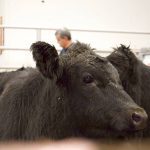Many were interested but few took part in a pilot mentoring program offered by the Organic Food Council of Manitoba (OFCM) this summer.
That has sent the organization back to the drawing board now on what might be a better way to help would-be farmers get the training and skills development they need.
OFCM rolled out the Manitoba Farm Mentorship program in late January, offering to place interns with established farmers for a growing season. The interns were expected to live and work on the farm in order to gain experience and learn required skills.
Read Also

Canada’s import ban on Avix bird control system ruffles feathers
Canadian producers’ access to Bird Control Group’s Avix laser system remains blocked despite efficacy studies and certifications, as avian flu deaths rise.
“We did get quite a few inquiries,” said Becky Elko, farm mentorship liaison with the OFCM.
But just two interns were placed for the 2009 growing season. One more may sign on for fall. There were nine farmers lined up to serve as mentors.
A big hurdle appears to have been not being able to earn any money during the mentorship, Elko said.
“I think that might have been a big part of it,” she said. The interns were expected to live at the home of the farm mentor they were matched with in exchange for room and board only.
Those contacting OFCM about the program tended to be married, or with a young family to support or university tuition fees to pay, “so it didn’t really fit with their situation,” Elko said.
ONLINE SURVEY
An online survey done by the OFCM this summer has tried to find out what will work better for future programming.
“What it looks like is that people are interested in on-farm internships but not necessarily for a full growing season,” Elko said. “And they’re also interested in a variety of other things, such as technical skills-building or business-planning courses.”
Nearly 30 per cent of those responding to the survey said they were “actively exploring/investigating farming as a career option” and 15 per cent said they were “committed but still in planning and gathering skills.”
Others described being in the startup stages, or modifying existing farm plans. Twenty per cent said they were “vaguely interested.” The majority who responded (71 per cent) indicated they do not come from farm backgrounds.
Based on what they’ve learned offering a pilot program this summer, and in survey responses, it looks like people want more flexible mentorship opportunities as well as evening, weekend or four-week courses as well, Elko said.
“Now that we have one season under our belt and have the responses from this survey we are more equipped to make some changes and create a more targeted program.” [email protected]

















